Премиум Работа с верхними сегментами рынка - [7]
У Премиум продуктов и услуг обязан быть ВАУ фактор.
Чтобы клиент читал описание и приплясывал от нетерпения. Чтобы народ записывался в очередь за несколько недель. Чтобы рассказывали и хвастались всем друзьям и подругам.
Бентли, Ламборгини, Тиффани, Гуччи, и прочие и прочие и прочие…
В мини-Премиум (класс "affordable luxury") - Apple, iPhone и iPod. Mini Cooper. Старбакс. Ferrero Rocher, наконец…
Но это - уже другая тема для обсуждения:)
P.S. Кстати, именно в категории мини-Премиум лучше всего и работает вирусный маркетинг.
МИНИ-ПРЕМИУМ…
По вопросам в чате вижу, что тема о категории мини-Премиум очень всех заинтересовала.
Очень хороший обзор этого рынка (на англ.) можно прочитать в следующей статье. Включая статистику, примеры и тренды.
"Luxury is not what is used to be. How can anything be aspirational if everyone has it? This new feature looks at how luxury has become almost commonplace and has lessons for not just luxury goods marketers but anyone looking to build aspirational qualities into their product or service." The Global Trend towards the Democratization of Luxury A compilation of trends, issues and thoughts concerning this new market By Budd Margolis Imagine the contradiction of the term affordable luxury. There is a new egalitarianism or democratization of luxury developing over the past decade which is pressuring the top-tier marketers to innovate faster and think quicker in order to stay ahead of the crowd. The growing wealth of the world’s consumers and the communication of vast amounts of information are creating a new and very considerable trend towards mass consumable luxury goods. The question then for the leading brands is, if everyone can afford what was once rare and special how can it remain a luxury? How does one defend against brand erosion when trying to grow revenues by appealing to the mass market? Is the trend towards the democratization of luxury something that will destroy a brands integrity? Is easily accessible luxury good for the luxury companies, for the aspirational consumers or for society in general? The luxury market has experienced tremendous growth over just the past decade and is growing by 10 to 20 percent annually. Last year, luxury purchases accounted for about 20 percent of the $2.35 trillion American retail sales market. The trends for the world mimic what is expected from America where 47 million households desire luxury, projections for the market are expected to expand from $400 billion to $1 trillion by 2010. Globally the trend is also on the steep incline with continued support from Japan and Korean and the emerging and considerable markets of Indian and China. The world’s population continues to grow and so does the amount of wealth now available to the world's consumers. Scores of millionaires are flourishing in emerging, often once former communist countries and there is no end in sight. Their need to distinguish themselves and define their class is a deep seated, even genetic, human trait common to all people everywhere. Since ancient times the human race has sought luxury, no matter what the financial or human cost. It is one constant of human behaviour that is always present. It is also a good concept for people to think of waiting longer in order to save up and afford better although more expensive goods. This thinking leads to greater satisfaction with luxury purchases over a longer period. Better goods are also treated better and quality also lasts longer either from wear or respect unless one is a very serious fashion victim who changes with the winds of trends and taste. Wal-Mart is hard at work convincing us that everything we desire is easily affordable and available at their stores. Many of us are susceptible to the overwhelming amount of marketing that continuously encourages us to obtain more things when in fact we already have too many products that we are hardly use and rarely enjoy. Is it really worthwhile having an ice cream machine if it is used just three times a year? It may take up valuable shelf or counter space and the cost could have been used to purchase luxury brands instead and saved time and effort? Once our closets, garages, lofts and basements fill up with stuff, what then? There are, of course, serious economic, environmental, political or ethical considerations to any purchase choice we make and these considerations will have greater impact in the near future as consumers become more powerful and aware. It has been a rough economic period not just for the luxury goods industry with new fears such as global terrorism and SARS to contend with. However, there may be some light at the end of the tunnel although many still remain sceptical. For luxury goods there can be good periods in the midst of uncertain times as people seek to hold liquid assets whether for real or imagined situations. People tend to buy expensive objects to feel better, reward themselves, display status or to provide a sense of security. Negative pressures often drive consumers towards new purchase patterns or to strengthen those patterns which promote a sense of relief or purpose in their lives. They may also drive the desire to enjoy a moment as with consumed goods or the sense of touch or possession of a certain object. Many people buy objects they do not really need as a way to seek fulfilment, reward, status or provide a deep emotional satisfaction and often their choices provide temporary distraction. Luxury goods provide a new and aspirational reward which covers status and delivers a deep seated need to feel valuable and worthy in a world depicted by the media as perfect and orderly. Just about everyone in the magazines, billboards or on the telly are good looking, healthy and successful. One is included in the club by the simple act of acquiring the particular object of desire. The very concept of luxury has been democratized and its meaning has transformed into a new and less powerful word. It is overused and has decreased in value yet it still remains connected to all that is fine, rare and special. A luxury good must bring the owner pleasure and the longer one owns, it the more one's appreciation grows for it. How then can a hamburger or toilet paper be described as a luxury or luxurious item? Such products either retain their value or increase in value or one's appreciation for it. The only solution would be to establish a language police to clean up this mess and that seems about as reasonable as eliminating crime. "Old luxury" was what was rare and hard to acquire because of its refined qualities. The good required the highest standards and talent to manufacture and included the best and often most expensive of materials and therefore the object was only available to the very rich. Today’s "new luxury" is readily available to the middle classes who have increasingly greater amounts of disposable income, time and desire. Expensive brands such as Mercedes offer affordable versions of their brand while it is still true that a majority of Gucci handbags will be purchased by women who make less than?18K annual income. Luxury brands are capable of 20 percent to 200 percent margins because of the high perception of value that is attributed to them. Reputation and brand integrity are as much of the products make-up as the leather or history associated with the product. You may think it’s just a handbag but you have also acquired the marketing spiel that says this is your entree ticket to a tradition of several hundred years of craftsmanship and the relentless pursuit of perfection. You have joined the club! But if everyone has access to this new world where is the differentiation? How is it that the brand survives when it becomes a mass luxury? Is there really that much to distinguish a C class from an E class Mercedes or is this the start of an evolution towards the democratization of luxury where the "Old luxury" terminology no longer counts? It is far too early in the process to know what the effects actually are but initial success does not indicate the impact such actions may have and sometime soon such companies may decide to retract from the mass luxury strategy and downsize in order to rekindle their exclusive brand distinction. Starbucks is a good case study as it has successfully grown a common product or consumable into a perceived luxury. Starbucks has brought new meaning to hot brown water and ground beans as they offer some 19,000 permutations of a cuppa Java at an enormous and profitable margin. Customers customize their product and buy into the marketing concept. Starbucks has a unique culture which of course has its own language. My brew in the occasional morning is simple: a Grande double shot latte sometimes with foam depending upon my mood. There are others who can concoct complex formulae which only a trained and skilled Barista can decipher. There is better coffee out there but few brand it as well and thus the growth of Starbucks to a $4b USD business with numerous worldwide outlets. To counter the green and labour activists Starbucks has joined the Fairtrade Foundation, which supports the local farmers around the world, and displays brochures at its many outlets which promote programmes to support local coffee farmers. With every bag of African beans Starbucks offers 75p to a charity that is building schools in Southern Ethiopia and last year Starbucks UK contributed?50,000 from this activity alone. The lesson is that one can develop an "experience" or "culture" as a method to distinguish an offering and by doing so creates an identity that the consumer can relate and belong to. It is indeed sad to think that instead of offering a better standard of life, our modern society has fragmented the core of family and community and we are being marketed a new order which fills some of the voids left in our lives. There are lifestyle luxuries which provide status and usefulness which would possibly be defined when you purchase a Patek watch, Vuitton bag or a Mercedes automobile. Certain trendy fashion labels also provide instant status and knowing what’s in or out is as vital as having the funds to acquire such goods. These items are meant for public display. We desire emotional gratification and therefore resort to the most temporary of delights with the ultimate indulgences. Little luxuries, disposable or consumable but always memorable such as chocolates and perfumes, flowers or a lunch out can provide a quick distraction or sense of well being. Indulgences are often very personal and often very private. Often there is a need to express oneself as a way to define one's place in the world and therefore the aspirational luxuries of antiques, art, fine jewellery, etc, have little practical value but allow purchasers to express themselves and their passions. These items are often very private and personal although easily accessible in a home or office. There are three converging trends which are driving a new thinking towards upscale marketing but first consider the progress we have made as a consumer society. The global consumer is being marketed from many more angles than ever before and each highly tuned sophisticated tactic is measured through complex metric and analytical tools while outsourced Indian call centres and digital TV pitch to us at every opportunity and at a reduced per inquiry/customer acquisition cost. We can buy into the hype that a product can change people's perception of who we are by accurately displaying our values and status or by providing solutions to problems we never knew we had. They might also provide some form of fulfilment for our deep seated desires or emotions. Some consumers of course will turn their backs and seek alternative lifestyles, possibly without all the communications delivery mechanisms we are surrounded by but emerging global markets will easily fill any imaginable voids or consumer backlash. The future, barring some catastrophe, seems blue sky indeed. We receive not hundreds but thousands of marketing messages and for those who desire but are not able to share in this paradise of consumption the feeling of rejection and resentment must be overwhelming. The frustration may possibly lead to the increased sense of disaffection from society many feel and this will lead to an increase in alcohol and drug abuse which leads to crime and further erosion of our society’s quality of life. The first trend we should consider is that companies are driven, as never before, to expand and grow revenues in the pursuit of vast and profitable returns for the investors and managers. The intensive drive is always for more and better returns and so expansion, often expensive and risky, continues but there are consequences and eventually they may be faced with brand erosion or worse a changed perceived image. Once highly defined and aspirational brands that have been over exposed will dilute their core values and thus retain a very small piece of their original value and lustre. Very few look to new methods such as the Internet or TV for fear of brand erosion but they do so at their own risk. There are methods for them to retain their integrity and reach out to new consumers while embellishing their brand. Not everyone can access their high street stores and the brand stories can be told better via new media than most other forms. In-store experiences with sales staff are not consistent or successful. Today, the favoured or typical method to expand is to roll out affordable versions or to build expensive new stores. With all strategies there is risk but one wonders why new concepts have not been properly tested while the most dangerous one of making luxury affordable seems to be in vogue The second trend towards global terror is not new but recently rekindled. We live in an increasingly populous and radical world where technology has forced confrontation between cultures as borders are relentlessly invaded by brands via the TV, mobile phones and the internet. This threat can not be completely prevented and resistance is probably futile. Consumers may be forced to stay at home, behind fortified walls with patrolling security cameras and guards. They will work, shop, gamble, interact with various forms of entertainment and of course chat throughout the day from their secure or perceived secure home. The outside world will become increasingly dangerous and the media, Fox News as one example, will feed stories of gloom and doom to this captive audience. The worse the news, is the better their ratings are. The modern world is hectic, frightening and insecure to many who are suffering and one form of relief is to reward oneself. This works on a number of levels as purchasing can fulfil our hunter/gatherer tendencies which are a deep seated genetic trait. In scary or difficult times people tend to either save more or buy quality goods in order to secure their value for future emergencies. They also have a need to find relief and indulge in self-gratification. The third and final trend is towards consumerism as a form of entertainment or break with reality. People need to aspire towards something and an improvement of their lifestyle, aspirational desires, have always been a much sought after goal. What is the sense of working hard and not reaping rewards? Why attain a level of status and not be able to display or enjoy it? And, with the increasing amount of stress in our lives, why persist with the ardour of our working life struggles unless we know at some point we can enjoy the fruits of this labour? The luxury industry feeds off this basic human instinct and with the growth of new and wealthy consumers who will enthusiastically joini the luxury market through their purchases. There is little doubt that the trend will experience significantly growth. There is some downside to all of this high-end consumerism with many issues to contend with such as ecological impact, labour ethics and the growth of the minimalist consumer. The mass media also contributes to the confusion and anxiety and might add to consumer stress. Certainly people have a choice but no-one is educating people of the effects of their choices and as we all know, people will not always gravitate to what is good for them. We live in a free society with too many choices which make us less and less satisfied with our lives. As with children who are constantly asked what they want or want to do, too many choices are a burden and cause more problems than solutions. Adults must face thousands of messages and choices daily and most decisions are made with insufficient thought or experience and lead to dissatisfaction. If we start to study how to cope with all the information and choice out there we might begin to take advantage of the richness of our society. But few of us have the luxury of time or the awareness to consider how to deal with it all. Mass luxury is just one aspect of the new wealth and we are faced with new challenges as change, often related to new concepts driven by technology which makes change happen quicker than at any time in our history. Information used to be the ultimate luxury but in a world of plenty it might be debilitating. We are exposed to huge amounts of information, mostly unfiltered and difficult to quantify and qualify, and this leads to more problems rather than better solutions. Today, accurate and reliable information is even more valuable than ever before but finding it within all the clutter is as hard as finding that diamond among the rough. Consumers know what they desire and they must always look upward towards goals ahead of their reach. It is up to the luxurious brands to provide the symbols of achievement, the rewards of wealth, the ultimate experience and the long term satisfaction of ownership which is becoming harder and harder as more brands become accessible to the mass market. Companies should focus on their best customers and look for new and better ways to reach them. They must also respect that consumer sdemand that the brands retain their values and image. They must constantly innovate and improve the design and desirability of the product and experience. The top luxury brands are driven to expand and grow, the world is progressively getting less secure and finally people buy to fulfil some need or void in their lives or as a form of entertainment. Mass market consumption of luxury is a new human capability and whether it is a good trend or something we will later regret will take some time to understand but we should be careful that we do not seek short gains at the expense of longer term vision. Tradition takes time and a great amount of care to create yet it can all be quickly destroyed if mishandled. Growth with purpose is of course the optimum goal but much of the growth has been lead by greed and history repeatedly teaches the lesson that greed, especially when combined with ego, can have very short sight and disastrous results. It may be time for some companies to look to create greater brand value by developing extreme scarcity not based upon price but upon limited production, reduced lines and access points. It will take a brave leader to convince shareholders that this is a way forward but for some I fear the time is near for this decision to be debated and seriously considered. Источник: www.poolonline.com
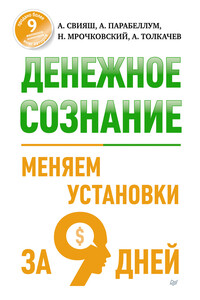
Эта книга написана одними из лучших тренеров в области личных финансов и успешных бизнесменов России, которые расскажут все свои секреты о деньгах, поделятся личными наработками, опробованными на тысячах учениках.Первый раздел посвящен психологии богатства – прежде чем предпринимать конкретные шаги к увеличению дохода (например, менять работу или открывать свой бизнес), полезно разобраться с внутренними барьерами.Известно, что знание само по себе ничего не дает – все решает действие. Поэтому, «расчистив поле» от негативных установок и неприятия денег, вы пройдете 9-дневный практический пошаговый тренинг.
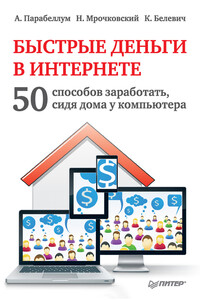
В этой книге представлены 50 реальных, законных и быстрых способов заработать, имея под рукой только компьютер и доступ в Интернет. Вам не понадобятся вложения и специальные знания. Все советы даны в сжатом виде – только самое ценное, что действительно работает, без «воды».По каждому из способов дана подробная пошаговая инструкция: что и как делать, в какой последовательности.Вы сможете заработать деньги буквально в течение нескольких дней, вам надо лишь взять и сделать то, о чем написано в этой книге.
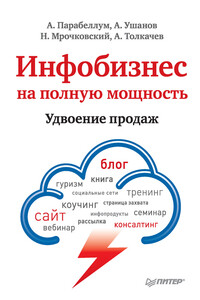
Книга содержит обобщенный опыт ведущих российских инфобизнесменов и тренеров по увеличению прибыли при работе с инфопродуктами. Предлагаются конкретные рекомендации, уникальные стратегии и практические задания. Материал представлен без скучной теории, заоблачных идей и «воды».Книга адресована в первую очередь инфобизнесменам (как опытным, так и начинающим), владельцам офлайн-бизнеса, которые хотят увеличить продажи с помощью Интернета, а также тренерам, консультантам и коучам.
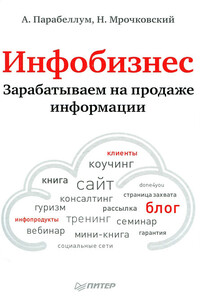
Если чему-то учиться – то из первоисточников. Эта книга написана «отцом-основателем» инфобизнеса Андреем Парабеллумом, который в 2007 году фактически с нуля начал выстраивать эту отрасль, а также одним из его самых успешных учеников Николаем Мрочковским, построившим крупнейший информационный бизнес в России. В издании пошагово разбирается вся суть построения собственного инфобизнеса с нуля до $10 000 дохода в месяц. Все основы создания и раскрутки собственного денежного источника даны в формате пошаговых практических инструкций.
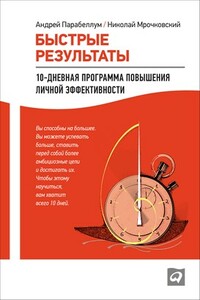
ЦитатаВы способны на большее. Вы можете успевать больше, ставить перед собой более амбициозные цели и достигать их. Чтобы этому научиться, вам хватит всего 10 дней.О чем книгаЕсли вам кажется, что в сутках слишком мало часов, вы все время работаете и все равно ничего не успеваете, откладываете жизнь «на потом» и в воскресенье вечером с ужасом думаете о завтрашнем дне, вам срочно нужно прочесть эту книгу. Тренинг, на основе которого она написана, перевернул жизни многих людей — пройдя его, они поняли, что могут работать во много раз эффективнее, уделяя при этом гораздо больше времени себе, своей семье и друзьям, своим увлечениям.
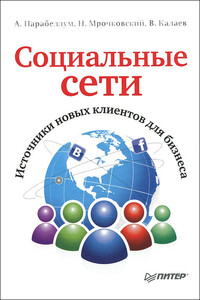
Книга содержит практические способы привлечения новых клиентов для бизнеса из социальных сетей. Более подробно в ней разобраны основные принципы продвижения бизнес-страниц в таких социальных сообществах, как «ВКонтакте» и «Facebook». Во второй части книги детально рассмотрены отдельные примеры продвижения. Ключевые моменты издания:– этапы и последовательность действий по привлечению клиентов;– получение потока клиентов;– монетизация;– оптимизация сайта;– оформление бизнес-страниц;– генерация и публикация контента.Рекомендуется всем, кто хочет использовать новые источники привлечения клиентов.

Эта книга для тех, кто мечтает получать жизненную прибыль: удовольствие и доход от любимого дела. Мечтает, но никак не может решиться. Мечтает, но не начинает. Почему так бывает? Мы боимся что-то менять в своей работе, потому что не знаем, как сделать правильный выбор. Потому что зависим от мнения окружающих. Потому что больше ориентируемся на внешние факторы — модно, престижно, доходно и т. д. — а не на свои личные ресурсы и потенциалы. Потому что у нас нет точки опоры, которая поможет разобраться со многими вопросами о профессиональной самореализации. Мы боимся поменять то дело и работу, которые привыкли делать на то, чем мечтаем заниматься.
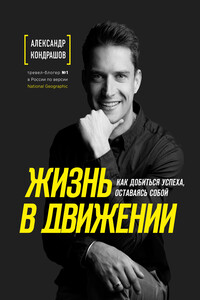
Александр Кондрашов – предприниматель, инвестор и тревел-блогер с суммарной аудиторией более 3 млн подписчиков. Канал «Александр Кондрашов» занимает лидирующее место в российской блогосфере по тревел-тематике. Более 10 лет владеет бизнесом по железнодорожным перевозкам, также основал свое рекламное агентство. В 2018 году отснял 31 страну. В своей книге Александр делится личными историями и жизненными принципами, благодаря которым он, обычный парень из простой, небогатой семьи, смог воплотить все свои мечты в жизнь.

В этой книге собрано сразу несколько историй, одна зажигательнее другой. Автобиография одного из самых ярких молодых бизнесменов последнего времени, начавшего свой первый бизнес в девять лет. История развития его компании Zappos, за десять лет с нуля разогнавшейся до миллиардного оборота. А главное – рассказ о том, как Тони и его соратникам удалось построить бизнес, радующий своим существованием не только владельцев, но и всех причастных к компании – от сотрудников и клиентов до поставщиков и партнеров.
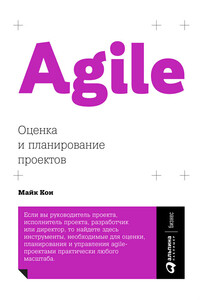
Оценка и планирование критически важны для успеха любого проекта. Однако процесс планирования сложен, и наши планы часто оказываются далекими от реальности. На помощь приходит Agile-подход. Благодаря Agile вы научитесь создавать реалистичные планы, которые сможете корректировать по ходу работы, при этом выполняя проекты в срок и в рамках бюджета.Майк Кон, гуру в области Agile, дает инструменты, необходимые для оценки, планирования и управления Agile-проектами любого масштаба. В книге нет теоретических рассуждений, она полна конкретных примеров, методов, графиков, рецептов, а главное — аргументированных рекомендаций.

Как животный мир удовлетворяет свои потребности, не имея денег? Мы бежим зарабатывать, и нам кажутся вполне очевидными причины гонки. Эта книга — попытка разобраться в устройстве и взаимосвязях человека и Вселенной, найти единый смысл перед забегом… Иначе зачем? Подобно вулкану, человек до какой-то поры пребывает в «спящем состоянии». Сейчас в Ваших руках книга-будильник, созданная, чтобы читатель проснулся и выплеснул наружу тот объём смыслов, который отвечает на вопрос — зачем…

Стать эффективным - просто, достаточно следовать пошаговым инструкциям описанные в книге. Здесь собраны алгоритмы действий, которые позволят тебе продуктивно использовать свои возможности как в бизнесе, так и в личной жизни. Просто делай раз, два, три. Все инструменты, описанные в книге, имеют практическое применение и опираются на реальный опыт.